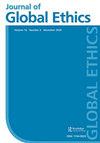‘All-under-Heaven’ (tianxia 天下): between idealism and realism
Q2 Arts and Humanities
引用次数: 1
Abstract
ABSTRACT As an idealist form of realism, or realist form of idealism, the system of ‘All-under-Heaven’ (tianxia 天下) seeks to find a rational and optimal solution to the problem of political conflict. However, it does not purport to offer the promise of universal happiness for all. Rather, this system envisages the possibility of another world; one of peace, general security, and civilizational vigor. In this sense, it is radically different from various proclamations of ‘the end of history’. The following aspects of the notion of tianxia are particularly worth emphasizing: firstly, ‘All-under-Heaven’ is not a utopia at all, but rather an ideal that can actually be realized. Secondly, the goal of a politics of tianxia is to resolve the problem of conflict by transforming hostility into hospitality, thus offering a new conception of politics beyond the struggle for power. Thirdly, the vision of ‘All-under-Heaven’ is grounded in three constitutive concepts, namely the ‘internalization of the world’, relational rationality, and ‘Confucian Improvement’, which together constitute a politics capable of transforming hostility into hospitality.天下天下): 在理想主义和现实主义之间
摘要作为现实主义的一种理想主义形式,或理想主义的现实主义形式,“天下”体系(天下天下) 寻求政治冲突问题的合理和最佳解决方案。然而,它并没有声称为所有人提供普遍幸福的承诺。相反,这个体系设想了另一个世界的可能性;和平、普遍安全和文明活力的象征。从这个意义上说,它与各种“历史终结”的宣言截然不同。“天下”概念的以下几个方面特别值得强调:首先,“天下”根本不是乌托邦,而是一种可以实际实现的理想。其次,天下政治的目标是通过将敌意转化为好客来解决冲突问题,从而在权力斗争之外提供一种新的政治观念。第三,“天下”的视野基于三个构成概念,即“世界的内化”、关系理性和“儒家改良”,它们共同构成了一种能够将敌意转化为好客的政治。
本文章由计算机程序翻译,如有差异,请以英文原文为准。
求助全文
约1分钟内获得全文
求助全文

 求助内容:
求助内容: 应助结果提醒方式:
应助结果提醒方式:


